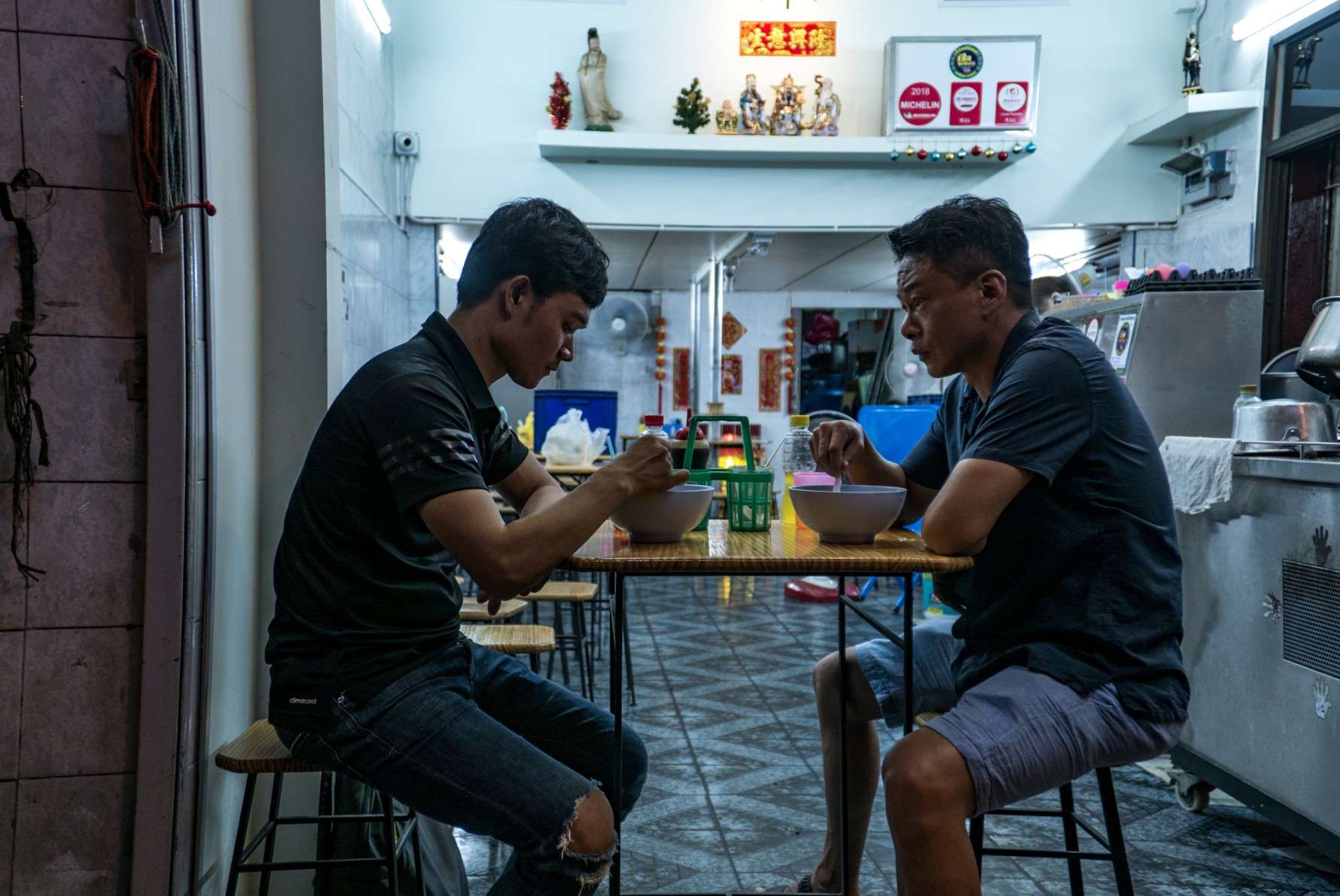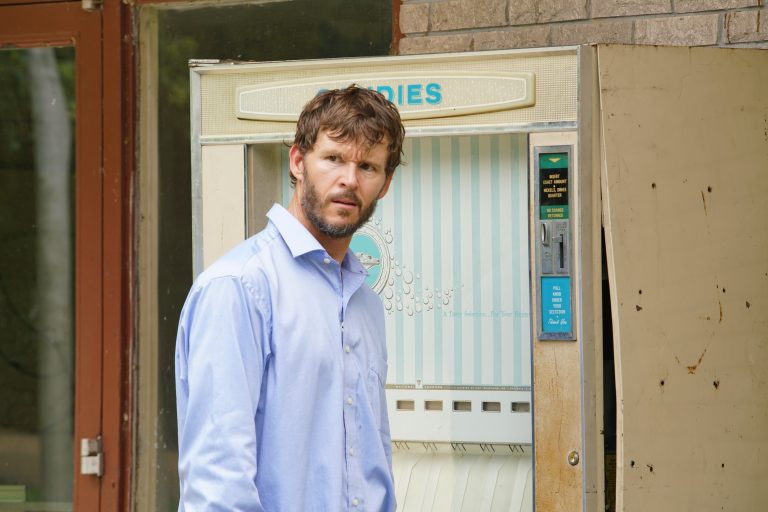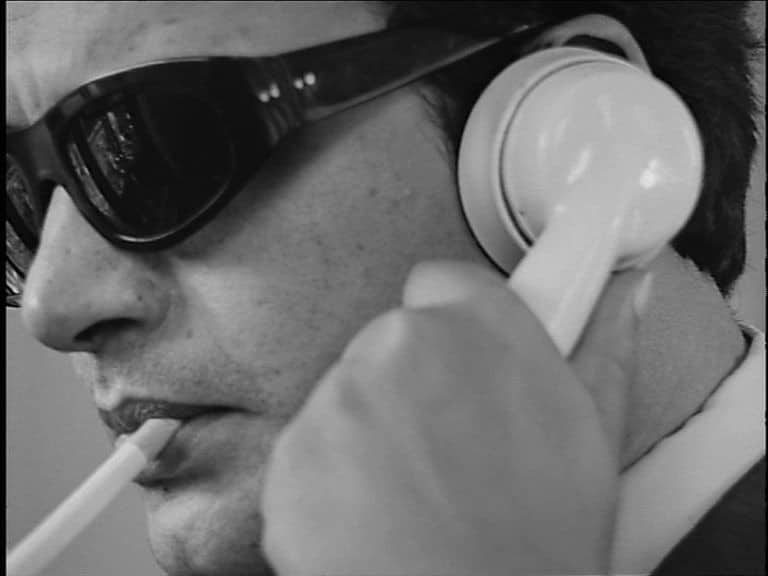Tsai Ming-Liang’s cinema, over the entire course of his career, has always gradually swung between marginalized lives and repressed desires. His latest feature, “Days” (2020, Rizi), a dialogue-free meditation spanning a little over two hours, places greater emphasis on the latter while traversing familiar avenues of solitude and longing. As always, it is the blank spaces within Tsai’s canvas that foretell the greatest (and frailest) emotional eruptions. The conflict is between man and the Self’s ceaseless innate quest for acknowledgment and acceptance from the Other, realized through carnal pursuits of love to supplant everyday mundanity.
“Days” outlines the meandering existence of two men, Kang (Lee Kang-Sheng) and Non (Anong Houngheuangsy), in different cities and following differing routines, yet leading similarly lonely lives. Kang, a Taiwanese, resides in a sprawling lavish house upon a mountaintop―the location an indicator of his state of seclusion―covered by a glass façade that allows glimpses of the interior, much like his own lined and wrinkled face. Non, a Laotian, lives in a small, unkempt apartment in Bangkok, spending his days cooking traditional dishes and at night cruising the streets looking for company. Both men feel trapped by their respective conditions, their yearning for release never quite materializing until that fateful night when the two meet in a hotel room. In fact, in the first two shots that he occupies, Non is tellingly framed behind bars.
Meanwhile, Kang undergoes a visibly painful form of muscle therapy to recover from an illness that is no longer limited to his physical being without much use. This extended sequence is mirrored by another much later on when Kang receives a massage from Non upon their first encounter, the former now groaning and grunting from pleasure as the massage gradually transforms into something more passionate. Their relationship may be founded on monetary transactions, yet it grows as the men share each other’s loneliness more than they share love. They begin to heal, knowing full well the fleeting nature of their bond.
Soon, the carnal connection transcends into the metaphysical, as Kang gifts Non with a little music box that plays the theme from Chaplin’s “Limelight” (1952). Tsai’s use of long, silent takes and minimal dialogue allows the weight of their connection to resonate through subtle gestures and lingering gazes, creating a profound intimacy that words could never fully capture. The gift of Chaplin’s “Limelight” music box from Kang to Non becomes a token of their shared understanding, a recognition of the fleeting nature of their bond, and a testament to the transcendent power of art to bridge divides and express the inexpressible.
Goodbyes are always difficult, especially so when they sever attachments bridging age, class, and nationality while demolishing gender stereotypes. Long, sullen silences replace conversation, communicating emotions that language never could, pierced by Tsai’s carefully curated sound design. The bustling urban cacophony serves as an apt counterpoint to his placid long takes filming the emotional stagnancy in the two men’s lives, their patient and sterile routines masking the desperation of spiritual crisis that grips every limb and sinew. Perhaps that is why “Days” concludes with the image of Non disappearing into the night―after waiting an eternity for someone who never shows up―even as the rest of the city speeds past him, unmindful and indifferent to his plight.

Tsai’s masterful direction emphasizes the mundane routines and quotidian details that comprise their lives, allowing the weight of their isolation to resonate with a numbing intensity. “Days” is a masterclass in slow cinema. Long takes, often exceeding five minutes, dominate the film. This deliberate pacing forces the audience to become intimate with the characters and their environments. We observe the minutiae: raindrops racing down a window, the flicker of a fluorescent light, the subtle expressions that flicker across faces. This slowness isn’t merely aesthetic; it functions by compelling us to pay attention to the emotional nuances of the characters and the quiet beauty of the mundane.
The film’s static shots are complemented by their minimalist mise-en-scène. The sets are sparse and unadorned, with little decoration or clutter. This austerity mirrors the solitude and emptiness experienced by the film’s characters while also inviting the viewer’s focus on the essential elements of the frame. Tsai’s use of negative space and minimalism is not only aesthetically striking but also serves as a metaphor for the characters’ emotional and existential voids. Further emphasizing the film’s contemplative nature is the near-absence of dialogue. “Days” is a film that speaks primarily through visuals and unspoken gestures. This creates a universality of experience. It transcends language barriers and invites viewers to project their interpretations onto the characters’ interactions.
The film’s sound design is noteworthy as well. Tsai employs long stretches of silence, punctuated by the occasional ambient noise or diegetic sound. This aural minimalism heightens the sense of isolation and loneliness while also drawing attention to the everyday sounds that often go unnoticed. The sparse use of dialogue further emphasizes the characters’ disconnection from one another, forcing viewers to interpret their emotions and motivations mainly through their actions and expressions. Tsai paints a stark portrait of urban alienation with his masterful use of space. Kang inhabits a vast, echoing house, far too large for just himself. The camera lingers on its empty hallways and cavernous rooms, mirroring the emptiness within him. The sterile, brightly lit hospital rooms where he seeks treatment for an unnamed illness further emphasize his disconnection. These spaces are cold and isolating, reflecting Kang’s emotional state.
In contrast, the young Laotian immigrant Non occupies a cramped, cluttered apartment. Yet, it holds a sense of lived-in comfort, a stark contrast to Kang’s sterile environment. Here, objects tell stories – a worn-out mattress, a well-used kitchen knife. These physical details offer glimpses into Non’s life and create a sense of intimacy sorely missing in Kang’s space. The film’s turning point occurs in a massage parlor, a space that deviates from the previous settings. Here, the camera lingers on the bodies, their touch offering a moment of respite from the characters’ loneliness. The massage parlor becomes a sanctuary, a temporary escape from the harshness of the outside world. It’s a space of potential healing, both physical and emotional.
Tsai Ming Liang’s “Days” (“Rizi”) is a masterful exploration of solitude, connection, and the passage of time. Through its formal and thematic elements, “Days” challenges the viewers to confront their own relationships with loneliness, routine, and the fleeting nature of time. Brief encounters with strangers offer glimpses of human warmth and empathy, highlighting the potential for meaningful connections even in the most solitary of circumstances. It is a film that demands patience and active engagement from viewers, but those who embrace its meditative qualities will be rewarded with a profoundly moving, thought-provoking, and borderline therapeutic experience.






![Interceptor [2022] ‘Netflix’ Review: This ship Was Sunk Even Before it Set Sail](https://79468c92.delivery.rocketcdn.me/wp-content/uploads/2022/06/Interceptor-2022-Netflix-Original-768x384.webp)
![Beanpole [2019] ‘MAMI’ Review – An Intense post-War drama from Women’s perspective](https://79468c92.delivery.rocketcdn.me/wp-content/uploads/2019/10/Beanpole-1-768x411.jpg)